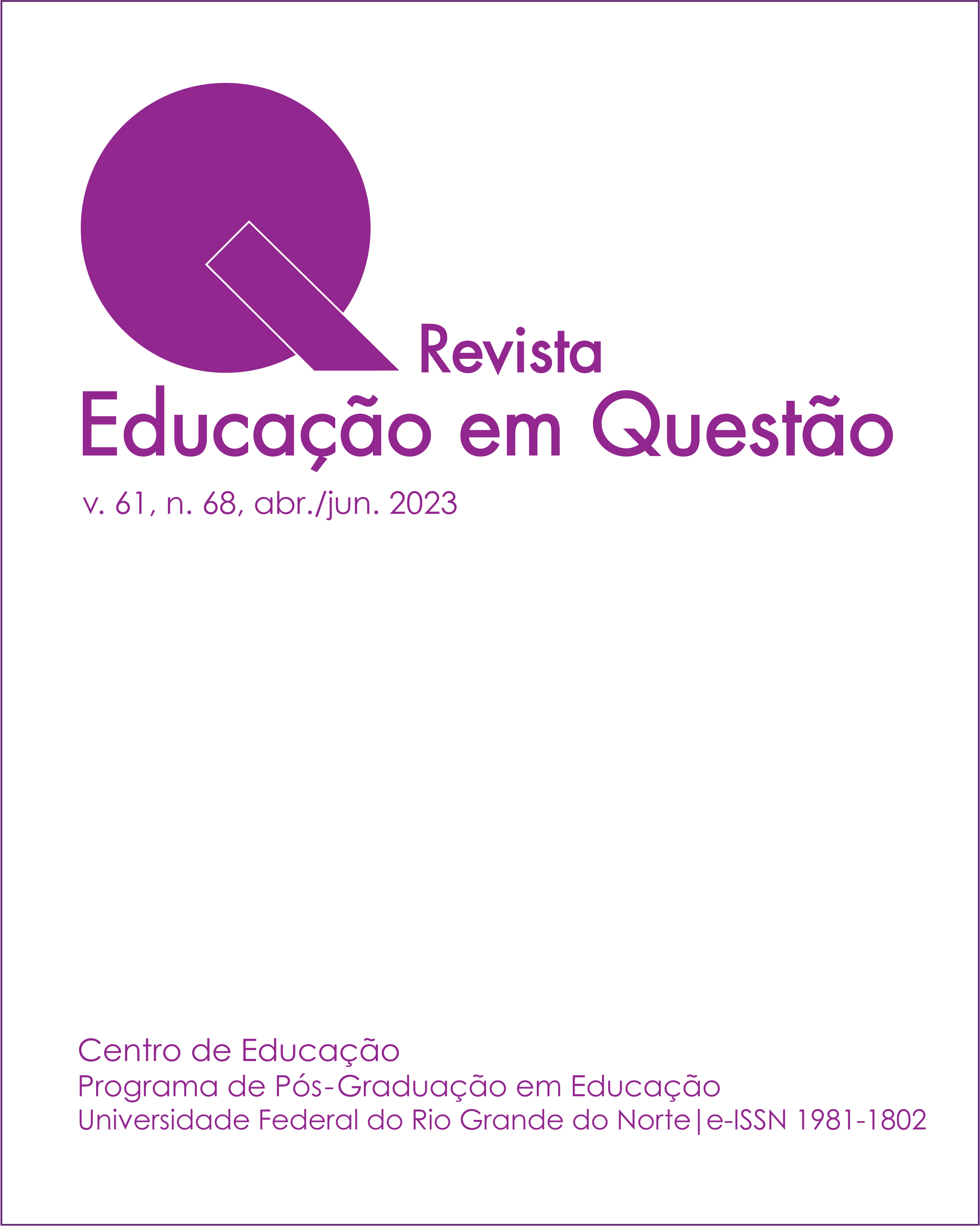Quien no hace trampa no deja la escuela?
El bricolaje de los estudiantes de secundaria
DOI:
https://doi.org/10.21680/1981-1802.2023v61n68ID32756Palabras clave:
Bricolaje, Trampas en las pruebas, Estudiantes de secundaria, Relación con el saberResumen
El artículo tiene como objeto de estudio la cuestión subjetiva, la relación entre los saberes de los estudiantes y los bricolajes que sostienen en las clases de enseñanza media de una escuela pública de la ciudad de Cumbe, Sergipe. Tenemos como punto de partida dos preguntas: ¿cuál es la relación entre el conocimiento de los estudiantes y el bricolaje? ¿Cuál es el significado de la trampa para los estudiantes? Utilizamos elementos de la relación de Bernard Charlot con el saber, principalmente, el deseo, la posición subjetiva, las figuras del aprendizaje y la relación epistémica con el saber; y la noción de bricolaje de Michel de Certeau. Se concluye que hacer trampa es una alternativa para que los(as) estudiantes no reprobar en una determinada disciplina con la que no tiene afinidad o le resulta difícil estudiar y aprender. Es un dispositivo motivacional, con carácter de inmediatez y movilización, debido a que encuentra sentido en la superación de las lógicas simbólicas de la escuela frente a una prueba escrita. Además, es un dispositivo de relación con el saber que confronta las normas y lógicas simbólicas de la escuela y de disciplinas específicas.
Descargas
Citas
CERTEAU, Michel de. A invenção do cotidiano: artes de fazer. Trad. Ephraim Ferreira Alves. 3. ed. Petrópolis/RJ: Editora Vozes, 1998.
CHARLOT, Bernard. Da relação com o saber: elementos para uma teoria. Porto Alegre: ARTMED, 2000.
CHARLOT, Bernard. Educação ou Barbárie? Uma escolha para a sociedade contemporânea. São Paulo: Cortez, 2020.
CHARLOT, Bernard. Os Fundamentos Antropológicos de uma Teoria da Relação com o Saber. Revista Internacional Educon, v. 2, n. 1, 1-18, 2021. Disponível em: https://doi.org/10.47764/e21021001. Acesso em: 24 mai. 2023.
CORREIA, Eanes dos Santos; SILVA, Veleida Anahi; NASCIMENTO, Willdson Robson Silva do; CHARLOT, Yan Cápua. A unidade dialética ensino e aprendizagem: um processo não linear. Revista Internacional Educon, v. I, n. 1, set. 2020. Disponível em: https://doi.org/10.47764/e20011009 . Acesso em: 25 mai. 2023.
CORREIA, Eanes dos Santos; SILVA, Veleida Anahi; NASCIMENTO, Willdson Robson Silva do. O que fazer com o que as aulas remotas fazem comigo? Posição subjetiva de estudantes de uma escola pública. Leitura: Teoria & Prática, Campinas, São Paulo, v. 39, n.82, p.109-124, 2021. Disponível em: https://ltp.emnuvens.com.br/ltp/article/view/882. Acesso em: 27 de mai. 2023.
ESTUDANTE 1. Questionário. Cumbe (Sergipe), 16 dez. 2022.
ESTUDANTE 2. Questionário. Cumbe (Sergipe), 16 dez. 2022.
ESTUDANTE 3. Questionário. Cumbe (Sergipe), 16 dez. 2022.
ESTUDANTE 4. Questionário. Cumbe (Sergipe), 16 dez. 2022.
ESTUDANTE 5. Questionário. Cumbe (Sergipe), 16 dez. 2022.
SARTRE, Jean-Paul. Crítica da razão dialética: precedido por questões de método. Rio de Janeiro: DP&A, 2002.
Descargas
Publicado
Cómo citar
Número
Sección
Licencia
Derechos de autor 2023 Educación en Cuestión

Esta obra está bajo una licencia internacional Creative Commons Atribución-NoComercial-CompartirIgual 4.0.
A la Revista “Educación en Cuestión” se reservan los derechos de autor pertinentes a todos los artículos publicados en ella.
Los autores y coautores de artículos y reseñas, publicados en la Revista “Educación en Cuestión”, tendrán un plazo de, como mínimo, de 1 (uno) año para que puedan someter nuevos trabajos para publicación.






